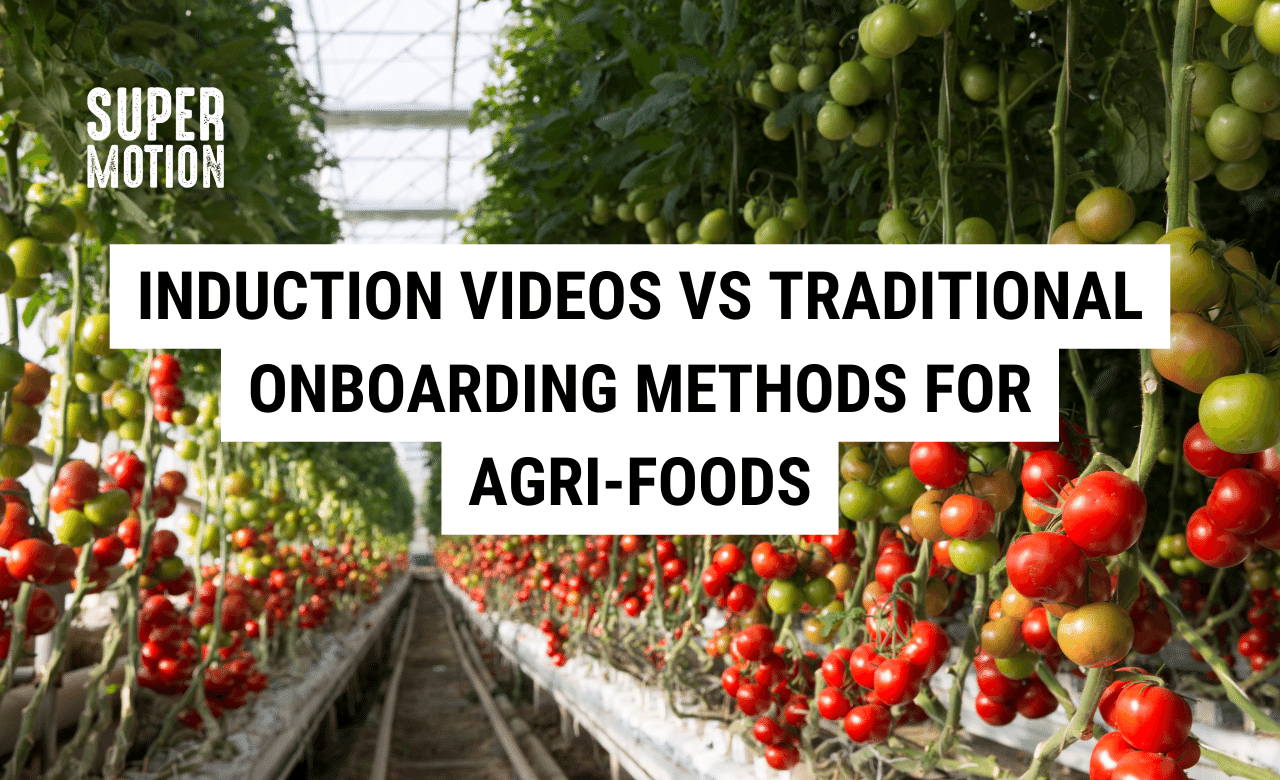Induction Videos vs Traditional Onboarding Methods for Agri-Foods: Which One Is More Effective?

Effective onboarding is essential for new employees to seamlessly integrate into a company’s culture and work environment. Traditional methods like face-to-face meetings and group training sessions have their limitations. That’s where induction videos come in as a modern and efficient alternative.
But how do induction videos compare to traditional onboarding methods in terms of effectiveness for Agri Foods?
In this post, we’ll weigh up the pros and cons of both approaches to help you determine the best fit for your organisation.
Video Inductions

Video inductions are interactive presentations that provide new employees with essential information about company culture, policies, and work environment. They offer an immersive learning experience through visual and auditory elements, replacing printed materials or in-person meetings or training sessions.
Save Time and Money
Induction videos can be a real time-saver for employers, as they can be sent to new staff before they start their employment. This not only saves money on organisation costs but also allows new hires to get acquainted with their new company before even stepping through the door. With Agri Foods often having a large number of workers, this is especially beneficial for companies processing and packaging food, as there are many roles that can be taught through video.
Consistent Messaging
One of the advantages of using induction videos is that the same message can be delivered every time, ensuring that new employees receive the same information about the company, their role, and safety procedures, amongst other things. Consistency is key in ensuring that everyone is on the same page. It is also important as new employees can feel disorientated if they hear conflicting information.
Helpful for a Diverse Workforce
As an Agri Foods employer, it is essential to consider your diverse workforce. Induction videos are effective in reaching a wider range of workers, including those who speak different languages or have reading difficulties. Many companies like to use subtitle options to help with language differences or even provide translations. Being able to understand the company’s procedures, to follow the health and safety rules amongst other things is essential for reducing accidents and errors that can be costly in a food processing plant.
Incorporating Accredited Food Safety Courses
Food safety courses are an essential aspect of Agri Foods. By using induction videos, companies can incorporate accredited food safety courses instead of separate training sessions, ensuring that new staff are trained and accredited before they start their work.
Traditional Onboarding Methods

Traditional onboarding methods have worked for many years and, in many companies, are still preferred.
Face-to-face introductions allow people to get to know each other and understand how the company works in a personal sense. For companies that prefer this direct approach, it can be reassuring to strengthen the face and place of contacts your employees have with each other.
Traditional onboarding often involves a structured system of introducing new employees into a company. There is a focus on covering comprehensive information such as the company’s development, outlining expectations during probation periods, staff handbooks and company procedures, among others.
Shadowing Opportunities
Traditionally, on-the-job training and shadowing followed introductions and made up the bulk of an employee’s induction period. Job shadowing can be especially helpful to new staff in seeing how the work gets done and asking any questions they have while watching the work done up close. It’s essential to keep in mind the safety of the food being processed, making job shadowing not possible in some areas.
Work In Progress
It’s helpful to note that traditional onboarding is often a work in progress, with regular feedback opportunities throughout the six-month induction period. This approach ensures that new employees are guided and supported, with specific goals identified, areas where they need to improve identified, and recommendations given on how to improve.
So, which is better?
Both induction videos and traditional onboarding methods have their own unique advantages and can complement each other effectively. So, instead of choosing between the two, consider harnessing the strengths of both approaches to create a comprehensive onboarding experience.
Induction videos can provide visually engaging and easily accessible information, while traditional methods like face-to-face interactions, allow for personal connections and hands-on guidance.
By combining these methods, Agri-Foods businesses can create a well-rounded onboarding process that maximises the benefits of both approaches.
If you’d like to explore how induction videos could help your Agri-Foods business, book here for a strategy call or get in touch on 01225 970242.
